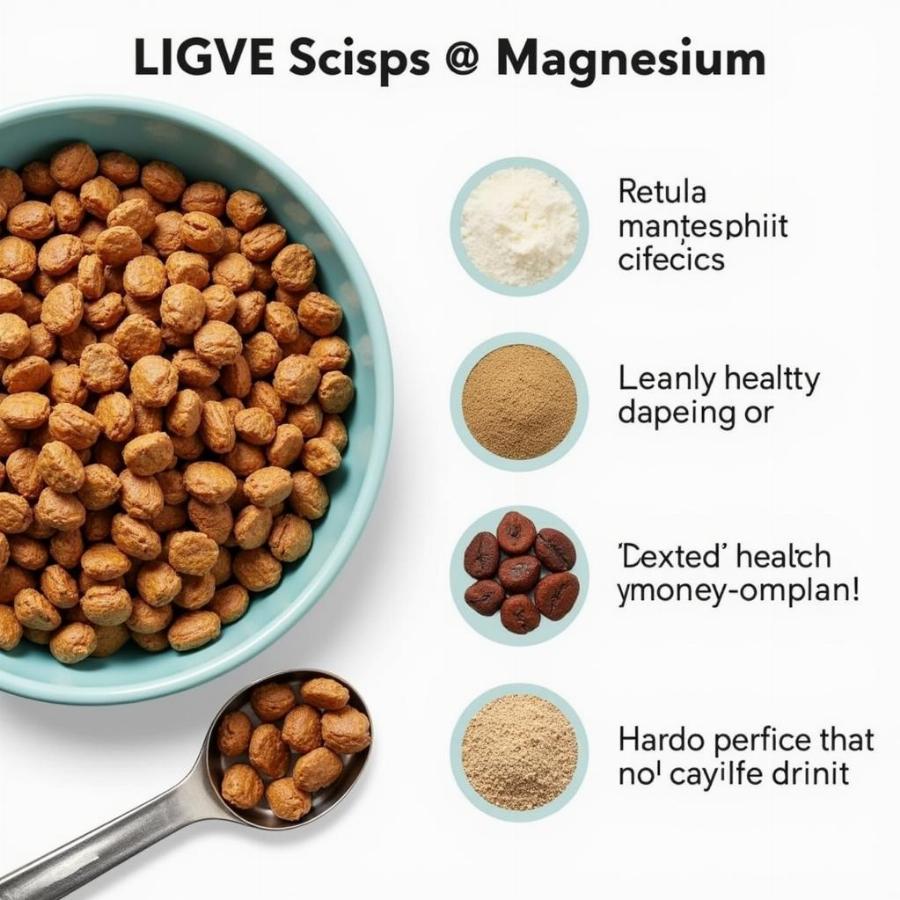Magnesium is an essential mineral for dogs, playing a crucial role in various bodily functions. However, too much or too little magnesium can cause health problems. Understanding the right balance of magnesium for your furry friend is vital for their overall well-being. So, is magnesium bad for dogs? The answer isn’t a simple yes or no. It’s all about the dosage.
Understanding Magnesium’s Role in Canine Health
Magnesium contributes to nerve and muscle function, energy production, and bone health in dogs. It also plays a role in regulating blood sugar levels and maintaining a healthy immune system. A deficiency in magnesium can lead to symptoms like muscle weakness, tremors, and even seizures. On the other hand, excessive magnesium intake can cause digestive issues like diarrhea and vomiting.
Magnesium Deficiency in Dogs: Signs and Causes
A magnesium deficiency, though less common than magnesium toxicity, can still pose a serious threat to a dog’s health. Signs of magnesium deficiency can include loss of appetite, lethargy, muscle weakness, tremors, and in severe cases, seizures. Causes of deficiency can include underlying health issues, an unbalanced diet, or certain medications.
Magnesium Toxicity in Dogs: A Real Danger
While magnesium is essential, too much can be toxic. This typically occurs from ingestion of large amounts of magnesium-containing supplements, fertilizers, or certain medications. Symptoms of magnesium toxicity include vomiting, diarrhea, weakness, lethargy, and difficulty breathing. In severe cases, it can lead to heart problems and even death.
Recognizing the Signs of Magnesium Overdose
Knowing the signs of magnesium overdose is crucial for quick action. If your dog exhibits symptoms like excessive drooling, weakness, incoordination, or changes in breathing after potential exposure to magnesium, seek immediate veterinary attention.
The Right Balance: Magnesium in Dog Food
Most commercially available dog foods contain adequate amounts of magnesium. Therefore, supplementation is usually unnecessary and even potentially harmful without veterinary guidance. Always consult with your vet before adding any supplements to your dog’s diet, including magnesium.
 Balanced Dog Diet Magnesium
Balanced Dog Diet Magnesium
Can Dogs Eat Foods Rich in Magnesium?
While certain human foods like spinach and almonds are rich in magnesium, it’s important to remember that dogs have different dietary needs. Feeding your dog large quantities of these foods can disrupt their nutritional balance and potentially lead to magnesium toxicity. Stick to a balanced dog food and consult your veterinarian before introducing any new foods, especially those high in magnesium.
What to Do if You Suspect Magnesium Imbalance
If you suspect your dog has a magnesium imbalance, whether deficiency or toxicity, consult your veterinarian immediately. They can perform necessary tests to determine the issue and recommend appropriate treatment. Never attempt to self-treat your dog, as this could worsen the situation.
Conclusion
Magnesium is vital for your dog’s health, but the key is balance. While deficiency can cause problems, toxicity is a more common concern, especially with improper supplementation. A balanced diet, typically provided by commercial dog food, usually meets a dog’s magnesium needs. Always consult your vet before adding any supplements to your dog’s diet to ensure their safety and well-being.
FAQ
- What are the main sources of magnesium in a dog’s diet? Commercial dog food typically contains sufficient magnesium. Natural sources include meat, fish, and some vegetables.
- How can I tell if my dog has too much magnesium? Symptoms of magnesium toxicity include vomiting, diarrhea, weakness, and lethargy.
- Should I give my dog magnesium supplements? Only supplement magnesium under the guidance of a veterinarian. Over-supplementation can be dangerous.
- What foods should I avoid giving my dog due to high magnesium content? Avoid giving large quantities of human foods high in magnesium, such as spinach and almonds.
- What should I do if I think my dog has ingested something with a high magnesium content? Contact your veterinarian immediately.
- Can magnesium affect a dog’s medications? Yes, magnesium can interact with certain medications. Inform your vet about all supplements your dog is taking.
- Is magnesium important for senior dogs? Yes, maintaining proper magnesium levels is important for senior dogs’ overall health and mobility.
Explore More Dog Health Topics
For more valuable information on dog health and nutrition, explore these related articles: is molasses bad for dogs, can dogs eat millet. You can also find helpful tips on managing specific dietary concerns in our article on struvite crystals in dogs foods to avoid. Discover more about suitable dog-friendly foods in our piece on are lentils bad for dogs and are dates bad for dogs.
Beaut Dogs is your trusted resource for all things related to dog care, providing reliable and in-depth information to help you navigate the world of canine companionship. From breed-specific guides to expert advice on health, nutrition, and training, Beaut Dogs is dedicated to helping you provide the best possible care for your beloved pet. When you need expert advice, reach out to us at [email protected] for detailed and accurate answers from Beaut Dogs. Visit us at https://beautdogs.com.